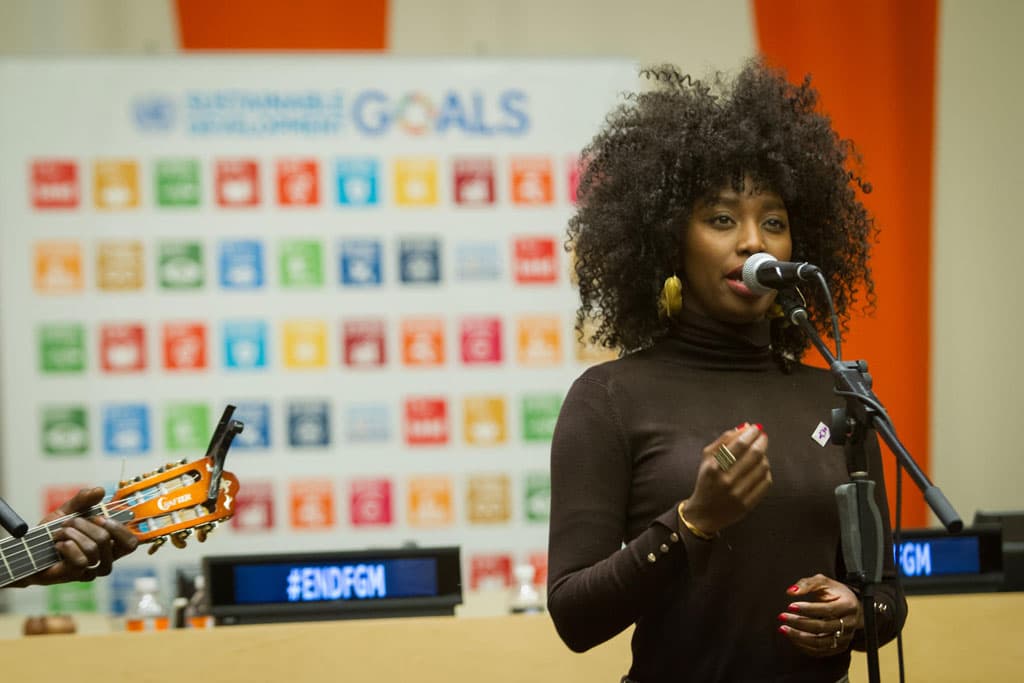Special UN event mobilizes action towards ending female genital mutilation within 15 years – Marking the International Day of Zero Tolerance for Female Genital Mutilation (FGM), dozens of women, girls, experts, and United Nations officials gathered today at a special event at UN Headquarters to discuss ways of eliminating the harmful practice by 2030 and to celebrate the increased mobilization against it.
“I am proud to be among so many champions in the cause of eliminating female genital mutilation,” United Nations Secretary-General Ban Ki-moon said during his keynote address, highlighting that the event is also “a celebration of women’s empowerment.”
FGM is a procedure that intentionally alters or causes injury to the genital organs of girls and women for non-medical reasons. It can cause severe bleeding and problems urinating, and later cysts, infections, as well as complications in childbirth and increased risk of newborn deaths.
According to a new report by the UN Children’s Fund (UNICEF), girls 14 and younger represent 44 million of those who have been cut, with the highest prevalence of FGM among this age in Gambia at 56 per cent, Mauritania 54 per cent and Indonesia where around half of girls aged 11 and younger have undergone the practice.
For Malian singer Inna Modja, the pain of FGM as a teenager was both physical and emotional. Wiping tears off her cheeks, she told members of the audience that it affected her sense of identity and made her doubt what she could achieve.
“I lost my identity when I went through FGM – I didn’t know who I was, I didn’t know what was my place in society, I didn’t know how strong I could be, because cutting me was telling me that I’m not good enough. So I had all these questions and music helped me to heal,” she explained.
Participants at the special event “Mobilizing to Achieve the Global Goals through the Elimination of Female Genital Mutilation by 2030” held on the occasion of the International Day of Zero Tolerance for Female Genital Mutilation (FGM). UN Photo/Rick Bajornas
Ms. Modja also shared that going through surgery to repair her mutilation helped a lot, because she felt she was doing something to get back what was taken away from her.
Today’s event also featured the launch of a new international symbol on FGM which will serve as the banner going forward to show commitment to eliminating FGM by 2030. Last September, UN Member States adopted the 2030 Agenda for Sustainable Development; for the first time, it includes a goal that explicitly names FGM as an instance of a “harmful practice” that should be eliminated to achieve gender equality and women’s empowerment.
The UN also reports that over the last 10 years, budgeting for this issue increased by 600 per cent. Other recent achievements include two more countries, Nigeria and the Gambia, passing legislation to ban FGM.
“Health workers in many countries are becoming more engaged as advocates and counsellors on FGM prevention in their communities. And young people themselves are serving as champions for FGM abandonment. We can see social change taking place at the community level,” said the Executive Director of the UN Population Fund (UNFPA), Dr. Babatunde Osotimehin, in his remarks.
Since 2008, UNFPA and UNICEF have been leading the world’s largest programme in 17 countries to end FGM within a generation. A central strategy of the programme is to support community-level activities to make individuals appreciate the benefits of not cutting their girls, to foster discussion, and generate sufficient collective support for entire communities to abandon the practice.
“This has resulted in more than 15,000 communities, representing around 12 million people, publicly declaring abandonment of FGM. But despite this progress, millions of girls are still at risk of being cut each year,” warned Dr. Osotimehin.
While in nearly all countries FGM is usually performed by traditional practitioners, UNICEF has found that more than half of girls in Indonesia underwent the procedure by a trained medical professional. Read More – Courtesy: United Nations news Centre

